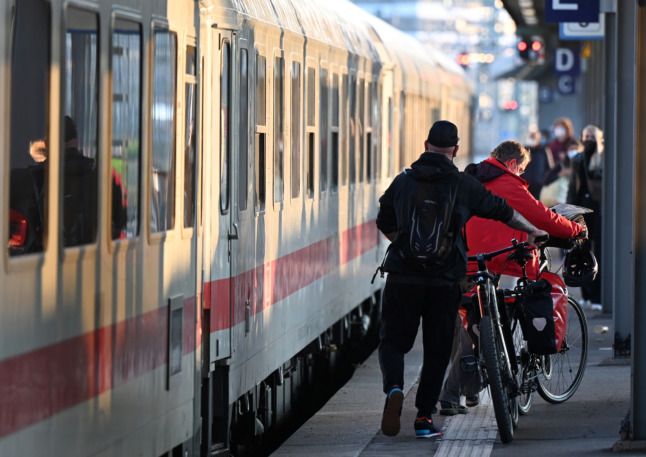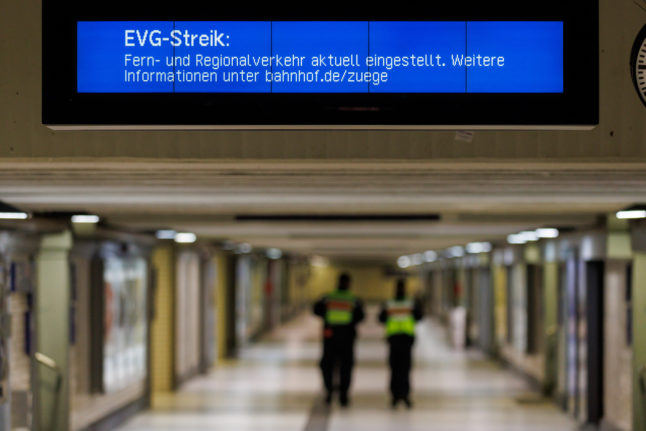What’s going on?
With a 50-hour warning strike, the Railway and Transport Workers’ Union (EVG) wants to bring all rail traffic in Germany largely to a standstill starting Sunday evening.
From 10 pm Sunday until the night of Tuesday to Wednesday at midnight, there will be no long-distance, regional and freight traffic, the EVG announced.
READ ALSO: German transport union announced nationwide 50-hour rail strike
The walkout is the latest in a series of strikes on Germany’s rail system in an escalating dispute between the union and management.
“Workers’ patience is now really exhausted,” said EVG’s deputy chairwoman Cosima Ingenschay.
“We are forced to go on strike for 50 hours to show how serious the situation is,” Ingenschay said at a press conference.
EVG represents 230,000 workers across some 50 transport companies, including Deutsche Bahn.
Which services will be affected by the strike?
In addition to Deutsche Bahn, around fifty other transport associations have EVG members, who are also likely to strike.

Deutsche Bahn said it anticipated the walkout having a “massive impact” on the rail network. Previous strikes have seen the entirety of the country’s regional and long-distance services grind to a halt.
Workers with most local transport associations though, including Berlin’s BVG and Munich’s MVV, are not part of these associations. That means that while the S-Bahn and regional trains in these cities won’t run during a strike, buses, U-Bahns, and trams can remain in service.
The strike could have far-reaching effects for other European countries, though.
Deutsche Bahn warned that freight services across Europe will also be impacted by the strike, as six out of ten European freight corridors run through the German rail network.
According to Deutsche Bahn, the strike is unlikely to impact train travel over the weekend, before Sunday at 10 pm.
What is the union demanding?
EVG is calling for a 12-percent pay rise over one year for the workers it represents, with a minimum increase of €650 a month.
EVG has rejected Deutsche Bahn’s offer of a five-percent increase in two steps, covering 27 months, plus an “inflation bonus” of €2,500.
Progress in negotiations over a new pay deal has been “difficult – if there is any at all”, Ingenschay said in a statement.”The existing offers have to be improved considerably.”
Over the last few months, workers in different sectors including healthcare, childcare and transport have gone on strike to demand better conditions.
Public service workers, however, are no longer striking en masse around Germany after reaching a deal for a 5.5 percent increase in wages.
The industrial unrest comes as consumers struggle with steep increases in prices, as the cost of energy and food has soared.
Inflation has cooled slightly in Germany in recent months but remained very elevated in April at 7.2 percent.
When could the strikes end?
The next round of collective bargaining between EVG and the employees is set to take place at the end of May.
But EVG has already warned that the strike actions could stretch on for weeks on end if a compromise isn’t reached.
“The next strikes will last longer,” Ingenschay told the Süddeutsche Zeitung in an interview in April, adding that the union could “paralyse the train network for weeks” and that this type of action might be necessary “so that it hurts the employer.”
READ ALSO: German rail union threatens week-long strike after failed talks
What should you do if your train is delayed or cancelled?
Those who can’t get to their jobs because of the strike are, unfortunately, not usually entitled to take a paid day off, and must organise for another form of transport.
However, parents who are unable to organise alternative childcare if their Kita (daycare) centre closes – for example, if not enough employees are available to keep it operational – are entitled to paid time off.

In certain cases of delay, passengers may be entitled to around €80 in compensation – whether for food, new tickets, or accommodation – from Deutsche Bahn.
Passengers are advised to keep all receipts from that day to prove what they’ve spent during the delay.
Passengers are entitled to a full refund if their train is cancelled. They can also claim a 25 percent rebate if their train is over an hour late – and a 50 percent rebate if it is more than two hours late.
READ ALSO:
- EXPLAINED: How to get compensation for delayed or cancelled trains in Germany
- Strikes: Do parents receive a day off work when Kitas close?
What’s the reaction to the strike?
Deutsche Bahn’s human resources chief Martin Seiler blasted the action.
“This insane strike is completely unfounded and overblown,” he said.
“Millions of travellers won’t get where they want to go – to school, to work, to their loved ones,” Seiler said.
German media are dubbing the 50-hour action a ‘megastrike’, similarly as they did to the joint all-day strike between public sector union Verdi and EVG at the end of March.
The Süddeutsche Zeitung ran an opinion piece with the headline “It’s enough with all the strikes,” arguing that while “of course, workers deserve fair wages”, the management and workers are putting themselves into “absurd conflicts”.
The Berliner Zeitung remained more neutral, simply saying that “The EVG is using the strike to distinguish itself as an industrial action force.”



 Please whitelist us to continue reading.
Please whitelist us to continue reading.
Member comments